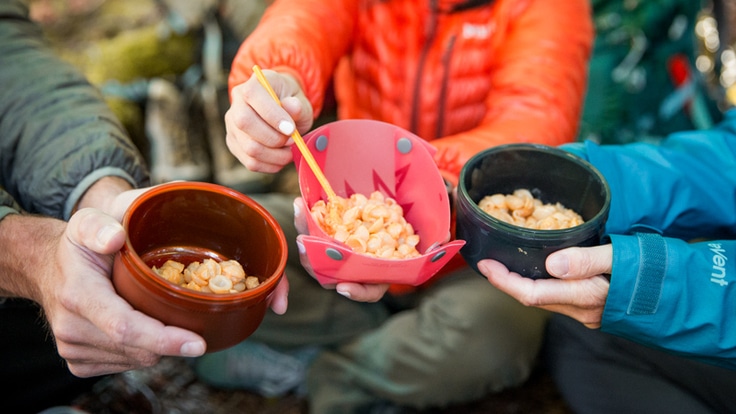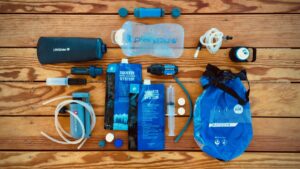For meal planning tips and hacks on extended backpacking journeys, consider using lightweight and non-perishable food items that are easy to prepare and have a high caloric value. It’s important to pack food that provides the necessary nutrients and energy for your body during long hikes.
Going on a backpacking trip can be a thrilling and challenging adventure, but it can also be physically taxing. Proper meal planning is essential for ensuring that you have enough energy to complete the journey. When packing for an extended backpacking trip, it’s important to consider the weight, nutritional value, and ease of preparation of the food you’re bringing.
In this article, we’ll go over some meal planning tips and hacks to help you stay nourished and energized during your journey.

Credit: www.rei.com
Understanding Your Caloric Needs For Extended Backpacking Trips
When planning meals for extended backpacking trips, understanding the calorie intake required for the duration of your journey is crucial. Here are some key points to keep in mind when calculating your daily caloric needs based on the intensity of your hike and your body weight:
- Your body weight significantly impacts the number of calories you require and, thus, should be a primary consideration when calculating your caloric needs for the trip.
- The intensity of your hike also affects your caloric needs. An uphill climb or challenging terrain will require more calories than a leisurely hike.
- As a general rule, hikers typically require between 2,500 to 4,500 calories per day on an extended backpacking trip to meet their energy needs.
Understanding The Importance Of Macronutrients In Your Diet
The next important aspect of meal planning for extended backpacking journeys is understanding the importance of macronutrients in your diet. Here are some key points to keep in mind:
- Macronutrients are essential nutrients that provide your body with the energy needed to function correctly. These include carbohydrates, proteins and fats.
- Carbohydrates are the primary energy source for your body, and it is crucial to incorporate them into your meals. Foods such as pasta, rice and oatmeal are excellent sources of carbohydrates to include in your backpacking meals.
- Proteins are essential for rebuilding and repairing tissue, making them a necessary component of your backpacking diet. Incorporating items such as nuts, seeds, and beef jerky can help to provide much-needed protein.
- Fats are a high-energy food source, making them ideal for backpacking. However, it is vital to ensure that you include healthy fats in your diet. Nuts, seeds, and oils are all great options to consider.
How To Balance Carbohydrates, Proteins, And Fats In Your Meals
Now that we’ve covered why macronutrients are essential let’s discuss how to balance them in your backpacking meals. Here are some tips to ensure that you achieve a balanced meal:
- Carbohydrates should make up the bulk of your meal, with a ratio of about 60/20/20 carbohydrates, protein, and fat.
- Protein should be included in every meal to help maintain muscle mass, promote recovery, and ensure optimal performance. Plan for at least 15-20g of protein per meal.
- Fats should be used to add flavor and provide additional calories for energy. Nuts, seeds, and oils are excellent sources of healthy fats to add to your meals.
Understanding your caloric needs, macronutrients, and how to balance them during an extended backpacking journey is essential for staying healthy, maintaining energy, and enjoying your adventure to the fullest. By following these tips, you can plan delicious and nutritious meals that will keep you fueled and ready to explore.
Meal Planning Strategies For Extended Backpacking Trips
Planning your meals for a backpacking trip can be challenging, especially when you’re going to be on the trail for an extended period. Here are some tips and hacks to help you prepare your meals ahead of time, maximize nutritional value, and minimize waste.
Preparing Your Meals Ahead Of Time And Minimizing Waste
- Plan your meals ahead using a spreadsheet or meal planner to organize your food items.
- Pack meals in resealable bags or containers to prevent spoilage and odor.
- Use dehydrated or freeze-dried foods to lighten your backpack and extend the shelf life of your meals.
- Pre-cook meals at home and store them in vacuum-sealed bags for easy reheating on the trail.
- Repackage bulk items in individual portions to reduce the amount of packaging waste.
- Bring along a collapsible sink or washing basin to help cut down on disposable kitchenware.
Maximizing The Nutritional Value Of Each Meal With Nutrient-Dense Ingredients
- Pack whole foods such as nuts, seeds, and dried fruits that are high in calories and nutrients.
- Consider bringing along supplements like protein powder, vitamins, or electrolyte packets to help you meet your nutritional needs.
- Incorporate a variety of carbohydrates, proteins, and healthy fats into each meal for sustained energy.
- Try to aim for at least 2 servings of vegetables per day by adding dehydrated veggies to meals or snacking on fresh produce like carrots, cucumber, or bell peppers.
- Experiment with different herbs and spices to enhance the flavor and nutrient density of foods.
Incorporating Shelf-Stable And Lightweight Foods Into Your Meals
- Pack shelf-stable items like powdered milk, nut butter, and dry cereal that can be mixed into meals or eaten as snacks.
- Consider packing shelf-stable meats like jerky or tuna packets for added protein.
- Opt for lightweight items like instant oatmeal, rice, or pasta that can be rehydrated quickly and easily.
- Bring along condiments like hot sauce, mustard, or ketchup to add flavor to your meals without adding weight.
- Pack reusable containers or bags for carrying extra food items or snacks during the day.
By following these meal planning tips and hacks, you can be sure that you’re properly fueling your body and reducing your waste on the trail. Happy hiking!
Conclusion
By implementing these meal planning tips and hacks, extended backpacking journeys can become more enjoyable and less stressful. Preparing ahead of time, utilizing lightweight and nutritious ingredients, and packing efficient cooking equipment can all make a huge difference in the success of a backpacking trip.
It’s important to keep in mind the specific dietary needs and preferences of each individual, while also considering the weight and space limitations of the backpack. With a little creativity and planning, delicious and satisfying meals can be enjoyed even in the great outdoors.
These tips and hacks can also be applied to other types of travel, making them versatile and useful for various types of adventures. So next time you embark on a backpacking journey, remember that meal planning can be just as important as mapping out a route or packing appropriate gear.
Bon appetit!




